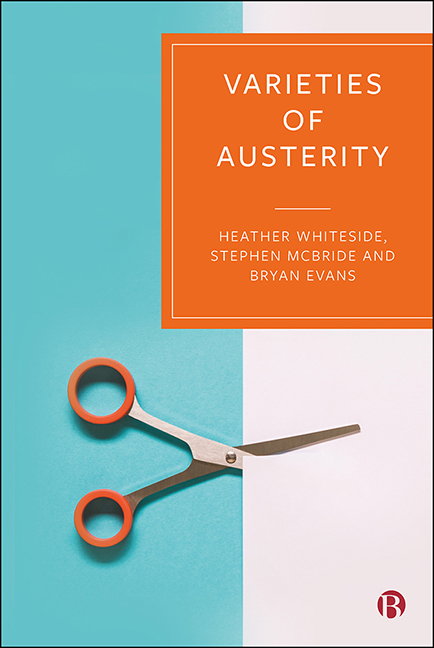Book contents
- Frontmatter
- Contents
- List of Figures and Tables
- About the Authors
- Acknowledgements
- 1 Introduction: Varieties of Austerity
- 2 Spending in an Austere Era
- 3 Selling Restraint
- 4 Transforming the Public Sector
- 5 Class Struggle from Above
- 6 Insecurity and Poverty
- 7 Limits and Possibilities of Resistance
- 8 Conclusion: Beyond Austerity
- Notes
- References
- Index
3 - Selling Restraint
Published online by Cambridge University Press: 04 January 2022
- Frontmatter
- Contents
- List of Figures and Tables
- About the Authors
- Acknowledgements
- 1 Introduction: Varieties of Austerity
- 2 Spending in an Austere Era
- 3 Selling Restraint
- 4 Transforming the Public Sector
- 5 Class Struggle from Above
- 6 Insecurity and Poverty
- 7 Limits and Possibilities of Resistance
- 8 Conclusion: Beyond Austerity
- Notes
- References
- Index
Summary
Public budgets might be thought of as technocratic documents that set out planned revenues and expenditures for the fiscal year. But with fiscal policy connected to all aspects of government activity, budgets hold significant repercussions for a wide range of actors including the state, private enterprise and labour. Budgets focus the relationship between government and economy: where and for whom spending and revenue are directed or diverted, implicating existing institutions, empowering (new or established) agencies, insulating or exposing particular segments of society, and insinuating degrees of blame and responsibility for both the good and bad times. Budgetary analyses must therefore consider the political economy context of fiscal crises, revenue and spending, and the relationship between state expenditures and private enterprise. The (re)allocation of public money by the state reflects the political priorities and choices of government.
The normative dimension of budget allocation is a prime expression of its politics. Consequently, the pre-eminent position of ministries of finance within the state ought to be no surprise. Likewise, monetary policy, commonly the preserve of independent central banks, affects not only the money supply but also interest and exchange rates, conditioning the behaviour of many economic sectors and government departments. Other strictures like balanced budget legislation and cost control equally pressure public decision makers, often with more to say on expenditures than revenues (especially revenue beyond taxation).
In this chapter on selling restraint through the politics of public sector budgeting, we analyze the fiscal narratives of Canada, Denmark, Ireland and Spain through a political economy lens that understands fiscal policy, public sector spending, cuts and reallocations to be intrinsically political activities, which fundamentally delineate the contours of the state–society relationship through changes (or lack thereof) on both revenue and expenditure sides of the ledger. In terms of national snapshots of how these countries got to austerity, we note diverse exposure to the 2008 crisis and thus diverse post-crisis financial sector support, stimulus and social spending.
To reiterate some of what was covered in the previous chapter, Denmark's banking sector and more generally the economies of Spain and Ireland were hit hard by the global financial crisis. Ireland's banking sector was in meltdown by 2008–09 and the government responded with dramatic protections for creditors and assets.
- Type
- Chapter
- Information
- Varieties of Austerity , pp. 55 - 80Publisher: Bristol University PressPrint publication year: 2021



